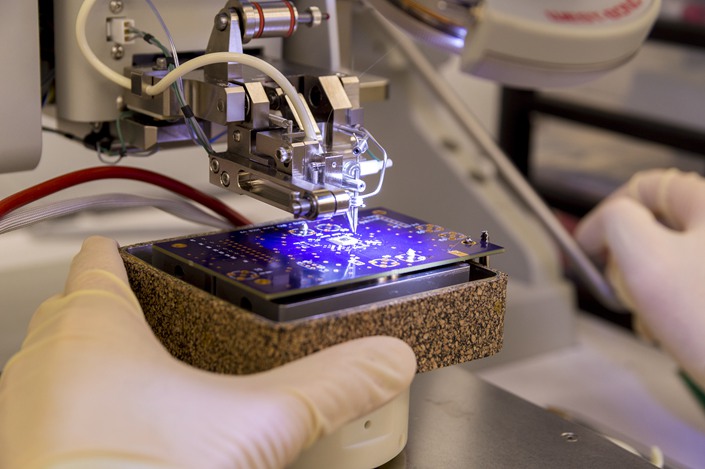China’s $18.5 Billion Chip Champ Hopeful Fights for Survival

An $18.5 billion company that aimed to become one of China’s leading high-tech chipmakers faces the risk of never getting off the ground due to a major cash shortfall, a local government authority close to the project has determined.
A collapse of the startup known as Wuhan Hongxin Semiconductor Manufacturing Co. Ltd. (HSMC) would be a major setback for China’s aspirations to become more self-sufficient in producing the high-tech chips that power most modern gadgets and devices. It would also spotlight the difficulties of building such complex companies from scratch, a growing reality China may face as a U.S.-led campaign restricts its access to Western technology.
HSMC’s large funding shortage was raised in a July 30 government report on the progress of investments in the Dongxihu district of the Central Chinese city of Wuhan where the project is located. The report said the cash shortfall raised the risk that the project could come to a halt at any time.
HSMC’s founders had big hopes for the company when they set it up late 2017, aiming to take advantage of billions of dollars being made available by central and local governments to build up the country’s chip industry. That drive has taken on extra urgency in the past year as the U.S. has slowly choked off the chip-making abilities of Huawei Technologies, whose HiSilicon chip unit was considered one of the nation’s biggest homegrown successes.
Read more
In Depth: China Creates New Memory Chip Champ, but Will Customers Come?
HSMC was meant to be developed in two stages with 128 billion yuan ($18.5 billion) in total investment, including a 52 billion yuan first stage and a second stage worth 76 billion yuan. Its website shows it was planning to carve out a niche making logic chips using 14 nanometer and 7 nanometer technology and smaller, which would have made it one of China’s most advanced manufacturers in the field.
The first phase began construction in early 2018, and at this point a production building and R&D building have been completed or are near done, according to documents from the Dongxihu government. More than 300 pieces of equipment for the first-stage are in the process of being procured, including cutting-edge equipment from the Netherlands’ ASML Holding capable of producing the most advanced chips — the only such technology of its kind in China to date.
The project was still moving full steam ahead as recently as July 2019 when it hired Chiang Shang-yi, a former co-chief operating officer of leading global contract chipmaker Taiwan Semiconductor Manufacturing Co. Ltd. (TSMC) as its chairman and chief executive.
But the first phase of the project ran into trouble late last year when a dispute erupted between its owners and one of the engineers helping to build it. As a result, a Wuhan court said the company could not use 55 acres of land where it was building its factory for the next three years, effective immediately.
At the same time, the company has yet to complete its acquisition and adjustment of permits for the land it needs for its second phase. Such a move is critical because it could pave the way for a request for approval by China’s state planner, the National Reform and Development Commission. Such an approval could open the floodgates for the company to receive billions of dollars being made available for such projects both from the central government and regional high-tech funds.
According to the July 30 report, the project has essentially ground to a halt with the prospect of getting any of its remaining 112.3 billion yuan in investment unlikely this year. That would mean the company may have already received and invested more than 15 billion yuan, based on the original plan to invest 128 billion yuan.
As the company’s troubles mount, recent talk has emerged that Chiang may have left the company. Caixin was unable to reach him for comment. But a posting dated July 8 on the company’s official website said that Chiang had taken part at a company event around that time.
Contact reporter Yang Ge (geyang@caixin.com) and editor Joshua Dummer (joshuadummer@caixin.com)
Download our app to receive breaking news alerts and read the news on the go.

- PODCAST
- MOST POPULAR






